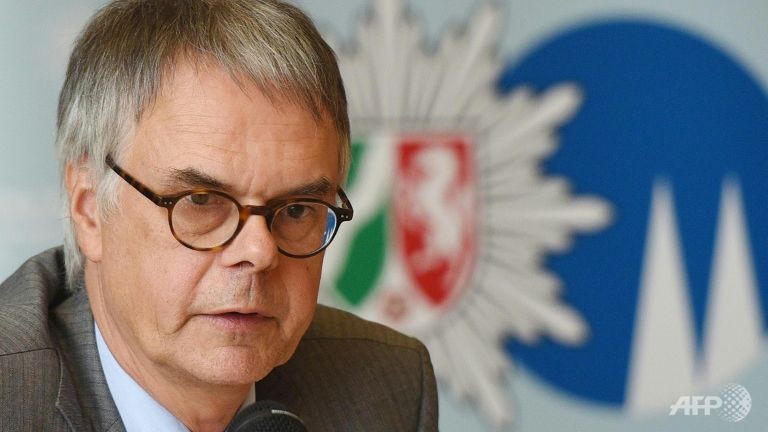German mob attacks claim Cologne police chief's scalp
 |
| Cologne's police chief Wolfgang Albers. (Photo: AFP/Henning Kaiser) |
BERLIN: The police chief of the German city of Cologne was suspended on Friday (Jan 8) for failing to stop mob violence at New Year's Eve celebrations, as authorities said many suspects were asylum seekers.
Unsettled by a record refugee influx, Germany has reacted with shock to news that women had to run a gauntlet of groping, lewd insults and thefts in an aggressive and drunken crush of around 1,000 men, described by witnesses as mostly of Arab and North African appearance.
Cologne's police chief Wolfgang Albers, 60, was suspended from active duty in order to "restore public confidence" in the police force, said Ralf Jaeger, interior minister of North Rhine-Westphalia state.
Albers had come under intense pressure - both for failing to stop the attacks, and for downplaying the true extent of the chaos, which only hit national headlines four days later.
Interior Minister Thomas de Maiziere had fumed that "police cannot work this way".
Having initially reported a "peaceful" night, Cologne police were slow to unveil the true extent of the carnage, as well as the politically charged fact that the hostile crowd was made up mostly of migrants.
By Friday, with more women coming forward, city police had received over 200 criminal complaints, mostly over sexual offences from groping to two alleged rapes, Spiegel Online reported.
As the furore grew, Chancellor Angela Merkel said she backed legal changes to make it easier to deport migrants who commit crimes, saying it was time to ask: "When do you lose your right to stay with us?"
POPULAR ANGER
A week after the assaults outside Cologne railway station and iconic Gothic cathedral, federal police said they had identified 31 suspects over offences from theft to physical attacks, though not sexual assaults.
Eighteen of them were asylum seekers, the interior ministry said.
Among the suspects were nine Algerians, eight Moroccans, five Iranians, four Syrians, one Iraqi and one Serb, as well as two Germans and one US national, ministry spokesman Tobias Plate said.
Outrage resonated beyond Germany, with Slovak Prime Minister Robert Fico, a hardliner on the migrant issue, calling for an extraordinary EU summit on the historic refugee wave.
Politicians were continuing "to trivialise - even after the attacks in Cologne and other European cities - the security risks associated with unregulated and uncontrolled migration within the EU," he said.
In Germany, assaults have inflamed a heated public debate about how to integrate the nearly 1.1 million asylum seekers the country took in last year.
Right-wing populists have charged that Merkel's liberal migration policy has fuelled crime and destabilised society.
The anti-migrant and Islamophobic PEGIDA movement has announced a rally in Cologne at 1300 GMT on Saturday.
Police expect around 1,000 backers of PEGIDA and the local far-right group Pro NRW, while counter-demonstrators have also vowed to take to the streets.
On Friday, Swiss artist Milo Moire threw off her clothes in front of Cologne's cathedral in protest against the sexual assaults, carrying a sign that read "Respect us! We are no fair game even when we are naked!!!"
TOUGHER DEPORTATION LAW?
Merkel's spokesman George Streiter said it was "important that the whole truth comes out", but also warned that migrants must not be put under general suspicion or collectively blamed.
"Primarily, this is not about refugees but about criminality," he said, noting that most asylum seekers in Germany have come seeking protection.
Still, the assaults have fuelled popular doubts about the biggest influx of asylum seekers to any EU nation and led German leaders to promise to better enforce law and order.
"We must do everything to prevent such incidents from happening again," de Maiziere told the Rheinische Post daily, pledging "more CCTV cameras in places where many people gather, a heightened (police) presence on the streets and harsher penalties".
Merkel's conservative party plans to discuss tougher policies this weekend, including the deportation of all migrants handed jail sentences by German courts.
Under current laws, asylum seekers are only forcibly sent back if they have been sentenced to jail terms of at least three years, and if their lives are not at risk in their countries of origin.
"We should ask ourselves whether it might be necessary to take (the right to remain in Germany) away earlier - and I have to say that for me, we must take it away sooner," Merkel said.
What the stars mean:
★ Poor ★ ★ Promising ★★★ Good ★★★★ Very good ★★★★★ Exceptional
Latest News
More News
- Russian President congratulates Vietnamese Party leader during phone talks (January 25, 2026 | 09:58)
- Worldwide congratulations underscore confidence in Vietnam’s 14th Party Congress (January 23, 2026 | 09:02)
- Political parties, organisations, int’l friends send congratulations to 14th National Party Congress (January 22, 2026 | 09:33)
- 14th National Party Congress: Japanese media highlight Vietnam’s growth targets (January 21, 2026 | 09:46)
- 14th National Party Congress: Driving force for Vietnam to continue renewal, innovation, breakthroughs (January 21, 2026 | 09:42)
- Vietnam remains spiritual support for progressive forces: Colombian party leader (January 21, 2026 | 08:00)
- Int'l media provides large coverage of 14th National Party Congress's first working day (January 20, 2026 | 09:09)
- Vietnamese firms win top honours at ASEAN Digital Awards (January 16, 2026 | 16:45)
- ASEAN Digital Ministers' Meeting opens in Hanoi (January 15, 2026 | 15:33)
- ASEAN economies move up the global chip value chain (December 09, 2025 | 13:32)
















 Mobile Version
Mobile Version